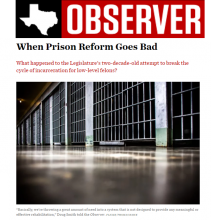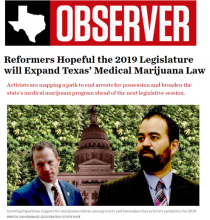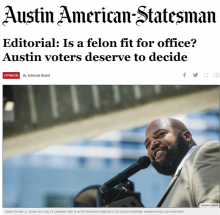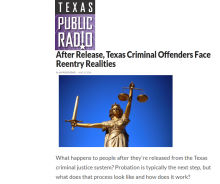Criminal Justice reform groups have criticized Kim Ogg’s request to hire 102 new lawyers. They argue more people will be jailed, but the DA says her office needs more staff to handle a backlog of cases.
Parole & Reentry
Convicted young, longtime Texas inmates hope Second Look bill could give them a second chance
The first time Michael Tracy skipped school, it was to help plan a robbery. He was 17, and reckless.
[2019 Session] Eliminate Automatic License Suspensions for Drug Offenses
Policy Background
A person convicted of a misdemeanor or felony drug offense in Texas will automatically have his or her driver’s license suspended for a period of six months – an overly punitive penalty that fails to relate to the offense, and which makes it more challenging to meet work, school, family, and, importantly, probation obligations. Enforcing this policy also diverts police attention and resources from actual public safety hazards on the roads, and it creates a heavy administrative burden to implement.
[2019 Session] Expand the Use of Reentry Peer Support to Decrease the Likelihood of Re-Offending
Policy Background
Peer support involves a trained Peer Support Specialist with histories of substance use, mental health conditions, and criminal justice involvement helping those with similar histories. These specialists have achieved a reasonable degree of stability in their own lives and are now employed by local government or nonprofit agencies to provide individualized support to others.
[2019 Session] Eliminate Occupational Licensing Barriers that Prevent Work-Ready Individuals from Finding Gainful Employment and Rebuilding Their Lives
Policy Background
Nearly 70,000 men and women reenter Texas communities after prison each year,1 and many face significant hurdles to employment, especially licensed professions. Texas requires occupational licenses for more than 25 percent of professions, but automatic exclusions and vague disqualifying criteria for people with criminal records pose barriers to licensure.
When Prison Reform Goes Bad
Doug Smith, a senior policy analyst with the nonprofit Texas Criminal Justice Coalition, says lawmakers never delivered on the rehabilitation-focused approach they had promised. Without re-entry planning, ongoing mental health care and other rehabilitative programs, many formerly incarcerated Texans have little chance of reintegrating into society.
Marijuana diversion works, but it’s not enough [Opinion]
Two years ago, Kim Ogg was elected district attorney of Harris County. One of her campaign promises was to implement a diversion program for first time offenders charged with low-level marijuana possession. These are cases where a person gets arrested for “two ounces or less” of marijuana.
Reformers Hopeful the 2019 Legislature will Expand Texas’ Medical Marijuana Law
Activists are mapping a path to end arrests for possession and broaden the state's medical marijuana program ahead of the next legislative session.
Editorial: Is a felon fit for office? Austin voters deserve to decide
Two years ago, the Austin City Council decided that local employers should get to know job applicants first before deciding whether a criminal record puts them out of the running.
Read the rest of this article at the Austin American-Statesman.
After Release, Texas Criminal Offenders Face Reentry Realities
What happens to people after they're released from the Texas criminal justice system? Probation is typically the next step, but what does that process look like and how does it work?
Read the rest of this article at Texas Public Radio's The Source.

![Marijuana diversion works, but it’s not enough [Opinion]](/sites/default/files/styles/medium/public/articles/2021-08/Screen%2520Shot%25202018-10-22%2520at%25208.47.21%2520AM.png?itok=42zIl9QB)


